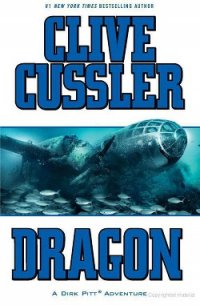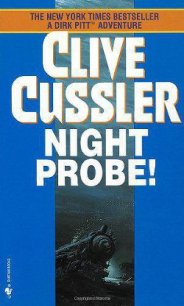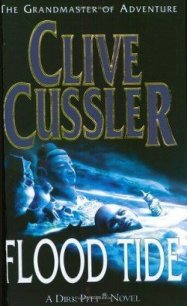Black Wind - Cussler Clive (книги полностью бесплатно txt) 📗
Kang brushed aside the comment. “As you know, I recently toured North Korea as part of a fact-finding trip sponsored by the Ministry of Unification. We found their economy to be in a moribund state, with food shortages widespread and rampant. The depleted economic state has taken a toll on the North Korean military as well. The military forces we witnessed appeared ill-equipped and extremely low morale,” he lied.
“Yes, I can attest to their struggles,” Won Ho replied. "But do really think reunification would be a benefit to our own economy?
“The northern provinces offer an abundance of cheap labor that is readily accessible. We would immediately become more competitive on the world markets, as our average labor costs would diminish substantially. I have assessed the impact to my own enterprises and make no secret of the fact that my profits could be boosted dramatically. In Hdition, the northern province economies would provide a new, un-ned consumption market that South Korean business is poised to No, gentlemen, there is no question that unification would provide an economic windfall to all of us in the south.”
“There is still the issue of North Korea's hard-line contention in the matter,” Won Ho stated. “We cannot simply achieve reunification unilaterally.”
“Yes,” Kim added. “They have repeatedly insisted that the United States military presence be removed from our soil before reunification can be considered.”
“That is why,” Kang continued calmly, “I am asking the three of you to support the resolution recently introduced in the National Assembly demanding the removal of all American military forces from South Korea.”
A stunned silence fell over the room as the three politicians digested Kang's words. Kang had brought them there for a reason, they knew, but the politicians had figured the corporate giant was seeking legislative tax relief or some other aid to his business empire. Not one of them expected a demand so risky to their political careers. The elder statesman Rhee finally cleared his throat and spoke deliberately.
“That particular resolution was introduced by radical elements in the assembly. There is little chance it would ever pass a full vote.”
“There is if the three of you came on record in support of it,” Kang replied.
“That's impossible,” Kim stammered. “I cannot support weakening our military defense for the asking while North Korea continues to consign all its resources toward boosting its military might.”
“You can and you will. With the recent murder of the girl in Kun-san City by the American serviceman, there is a firestorm of animosity toward the American military from the mainstream populace. It is incumbent upon you to place pressure on our president to act and act now.”
“But the American forces are essential for our security. There are over thirty-five thousand troops stationed in our defense,” Kim argued before being cut off.
“May I remind you,” Kang hissed, his face contorting into an evil smirk, “that I have paid and negotiated your way into the position that you hold today.” The controlled rage glowed from his eyes like burning embers.
Rhee and Won Ho slumped back in their chairs and nodded gravely, knowing their political futures were finished if knowledge of their graft over the years was ever released to the press. “Yes, it will be done,” Won Ho said meekly.
Kim, however, appeared oblivious to Kang's rage. Shaking his head, he replied firmly, “I'm sorry, but I cannot support placing our country at risk of military defeat. I will not vote in favor of the resolution.” He turned and peered at his fellow politicians with a look of scorn.
The room fell silent again for several moments before the servants returned to clear away the dinner dishes. Kang leaned over and whispered something into the ear of one of the servants, who quickly paced back to the kitchen. Seconds later, a side door opened and two hulking security guards, attired in black from head to toe, entered the room. Without saying a word, they strode to either side of Kim's chair, grabbed his arms, and yanked the politician roughly to his feet.
“What is the meaning of this, Kang?” he cried.
“I will suffer your foolishness no more,” Kang replied coldly. With a wave of his hand, the two thugs muscled Kim to a veranda door that opened onto an outside balcony. Flailing and struggling hopelessly against the stronger men, Kim was dragged outside and to the edge of the balcony wall, which jutted over the face of the rock cliff. Obscenities burst from his mouth as he demanded to be let go but his pleas were ignored. As Rhee and Won Ho looked on in horror, the two men in black hoisted Kim up off his feet, then unceremoniously pitched his thrashing body over the wall.
Kim's screaming voice could be heard trailing away for several seconds as he plunged down the cliff wall. A faint thud signaled that his body had struck the beach landing below and his screaming suddenly ceased. Rhee and Won Ho turned ashen white as the two thugs calmly returned to the dining hall. Kang sipped at a glass of wine, then spoke to the security men in a nonchalant tone.
“Retrieve the body and take it to Seoul. Plant him on a street near his residence and make it look like a hit-and-run traffic accident,” he ordered.
As they left the room, Kang turned to the frightened politicians and asked with icy politeness, “You will stay for dessert, won't you?”
Kang peered out the dining hall window and watched as Rhee and Won Ho anxiously boarded his yacht below. Kim's body, wrapped in brown blanket, had been crudely dumped on the boat's stern deck and covered with a tarp but was readily distinguishable to the two shaken men as they climbed aboard. Observing the yacht-as it cast off and began its fifty-mile trek upriver to Seoul, Kang turned as a man entered the room and approached. He had a scrawny build and greased-back black hair, with pale skin that seldom saw the light of day. His blue suit was well worn, and his choice of tie dated, but his white shirt was starched crisp. What Kang's administrative assistant lacked in panache he made up for in thrift and efficiency.
“Your meeting was a success?” the man asked Kang, with a dose of subservience.
“Yes, Kwan. Rhee and Won Ho are going to promote our initiative for the removal of U.S. forces through the National Assembly. It was unfortunate that we had to eliminate Kim, but it was apparent that he had lost his loyalty to us. His death will send a strong message to the other two.”
“A sensible decision. Sir, a courier from Yonan is arriving by boat this evening to receive the prototype missile guidance chip set that has passed final test at our semiconductor facility. Do you wish also to relay a briefing status?”
Like a foreign embassy in a hostile nation, Kang and his superiors in North Korea relied on couriers to funnel information, technology, and contraband out of the South. Although the Internet had become the spy's best friend when it came to dispatching information, there was still the need for one-on-one contact to transfer hard goods. An aged fisherman in a beat-up sampan, easily neglected by the Navy patrols, was the favored agent's disguise for crossing the DMZ to Kang's estate.
“Yes, we can report that a National Assembly vote will be brought forth on the expulsion resolution within the next several weeks, and that progress is being made on its passage. Our organized student protests are gaining momentum, and our media payoffs will ensure continued press attention and coverage of the U.S. serviceman murder incident,” Kang said with a wry smile. “Our external disruption plan is proving to be most effective. What remains to be seen is whether we can implement the chimera project quickly enough to maximize the Americans' strife. What is the latest from the biochemical laboratory?”




